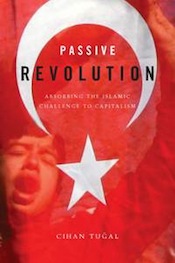
More than 10 million people in Egypt mobilized against a clumsy autocrat. Yet, their mobilization ultimately led to a military-judiciary seizure of power, with the support of centrist politicians and clerics. Call this what you like: coup d’état, elegant coup, or people’s power. None of these labels change the nature of the intervention and its aftermath: popularly supported military rule, by more or less the same military-police-judicial-business elements who were in power during Mubarak’s reign and who had struck a (shaky and incomplete) coalition deal with the Muslim Brotherhood.
The Tunisian and Egyptian revolts of the recent years sparked the imagination of many activists around the globe as “leaderless revolution”s. Yet, the strange amalgam of revolution, restoration, coup, democratization, and authoritarianism that persisted throughout the Egyptian process hints that different lessons need to be drawn from the Egyptian situation.
From a people’s campaign to the reassertion of elite rule
Tamarod, an unprecedented people’s campaign, collected millions of signatures and called for the downfall of president Morsi. Huge crowds gathered all around Egypt on June 30, 2013 in order to enforce the campaign’s call. According to estimates, around 15 million people took to the streets, making this the biggest rebellion in Egyptian history.
Ironically, the main mood among the protesters seemed to be pro-military. There were even groups that openly called for a military intervention. Among the protesters were not only pro-Mubarak civilians, but also thugs and Mubarak era security personnel who came to the square in their uniforms. Actually, during the month of June, it had become increasingly clear that the military intended to use the rebellion as an opportunity to intervene (and some politicians, who had previously made fierce statements against military rule, now welcomed the possibility in roundabout ways).
There were also other hegemonic forces bent on capitalizing on the protests and reinforcing their domination. For instance, Gulf intellectuals rejoiced in the troubles of the Brotherhood. They wanted a real Erdoğan as Egypt’s leader, not a “Taiwanese” version. They chose to ignore that their criticisms of Morsi (power-grabbing, centralization, authoritarianism, etc.) applied equally to their favorite Muslim leader. Regional hegemons thus suggested that the only way out of the Egyptian crisis could be another established path, rather than a truly revolutionary one.
There were calls for a general strike during the protests of June 30, alongside the louder calls for military involvement. In fact, the national situation that set the scene for Tamarod had a class dimension, though this was not articulated firmly as a part of its platform. Moreover, some groups in Tahrir (April 6, Strong Egypt Party, Revolutionary Socialists) openly protested against the military, not just the Brotherhood.
None of this, however, culminated in a roadmap that delineated the way out of the Brotherhood-military coalition (leaving the military and its new allies as the only actors capable of dictating the famous roadmap).
The uprising’s immediate result was the resignation of six ministers. Had a revolutionary political will crystallized in Egypt during the last two and a half years, it could have capitalized on this opening and declared an early victory; that is, it would have intervened before the Kornilovs of Egypt transformed it into their own victory.
When the military intervened, a few anti-coup speeches and slogans were drowned by the overall pro-military atmosphere in Tahrir. The unfounded optimism that anti-militarist forces would remain in the square until the military left did not change the main dynamics. Nobody mobilized Tahrir to fight their erstwhile torturers. Millions came back only in order to prevent the square from the Brothers.
Ultimately, July 2013 witnessed not only the removal of an unpopular president, but the making of a full-fledged dictatorial regime: A hasty crackdown rounded up hundreds of MB and non-MB Islamists. Many television channels were closed down. And most important of all, the military appointed an old regime  judiciary figure to replace the president. The massacres that followed were the necessary ingredients that accompanied any military takeover.
judiciary figure to replace the president. The massacres that followed were the necessary ingredients that accompanied any military takeover.
Misinterpretations
Most of the initial responses to the military intervention missed the crucial point: Under the Brotherhood-military coalition, Egypt was quickly moving from popularly supported authoritarian rule to popularly supported totalitarian rule; Tahrir activists had the radicalism and the will to slow down this transformation, but did not have the tools to stop it without the military’s pernicious “aid.” Procedure-focused liberal critics of the military intervention completely ignored that under certain conditions, an elected president can help build a totalitarian regime that will render all future elections simple plebiscites. The street needed to act to defend the Egyptian revolution and perhaps even to recall the president. Liberal accounts, with their pronounced fear of the mob, ruled out not only such risky moves, but all other forms of participatory democracy.
As dangerous were the (perhaps well-intentioned) accounts that listed the abuses of the Brotherhood-military regime, but stopped short of discussing the calamities a non-Brotherhood military regime could produce. Those who called the military coup a “second revolution” quickly pointed out all the autocratic moves of the Muslim Brotherhood regime. But they did not explain in what sense the regime that would replace it had the potential of becoming a democracy. (A broader circle of pro-Tamarod intellectuals focused on the illegitimate moves of the toppled president, without going into whether and how these legitimized the moves of the military and judiciary after he was deposed).
The assertion, frequently seen in both English and Arabic, that “all the factors that render January 25 a revolution also legitimize calling June 30 the second revolution” ignored one blatant fact (along many others): 2013 is not 2011. In other words, two years have passed that have led to different social and political possibilities. During these two years, the priority could have been organizing popular power, alternative institutions, and revolutionary leadership in order to prevent (or at least slow down) the increasing authoritarianism of elected powerholders, rather than toppling them to open the way for the old enemies of the revolution.
Some commentators still insist that neither the military nor the National Salvation Front (the coalition of anti-Brotherhood centrist politicians) represents the masses in Tahrir, whose real demand is democracy and early elections. This disclaimer on behalf of the apparently pro-military millions does not alter one of the rules of thumb of politics: Those who cannot represent themselves will be represented.
The fruits of the ideology-less “revolution”
This old statement regarding the French peasantry warns us against the beautification of non-organized masses, a romanticization now in high fashion. Multiple anti-representation theses from rival ideological corners (anarchist, liberal, autonomist, postmodernist, etc.) all boil down to the following assumption: when there is no meta-discourse and no leadership, plurality will win. This might be true in the short-run. Indeed, in the case of Egypt, the anonymity of Tamarod’s spokespersons initially helped: the spokespersons (who are not leaders, it is held) could not be vilified, demonized as partisan populists. Moreover, thanks to uniting people only through their negative identity (being anti-Brotherhood), as well as to its innovative tactics, Tamarod mobilized people of all kinds. Still, the mobilized people fell prey to the only existing option: the old regime!
When the revolutionaries do not produce ideology, demands and leaders, this does not mean that the revolt will have no ideology, demands and leaders. In fact, Tamarod’s spontaneous ideology turned out to be militarist nationalism, its demand a postmodern coup, its leader the feloul (remnants of the old regime). This is the danger that awaits any allegedly leaderless revolt: Appropriation by the main institutional alternatives of the institutions they are fighting against.
It is time to globalize the lessons from the global wave of 2011-2013. Let’s start with the US and Egypt. What we learn from this case is that when movements don’t have (or claim not to have) ideologies, agendas, demands and leaders, they can go in two directions: they can dissipate (as did Occupy), or serve the agendas of others.
We are living in interesting times. Unlike the depressing three decades that stretched from 1980 to 2010, “the people want the system to fall,” as the Arab slogan goes. And the system is very likely to fall, not just in Egypt but in many other places throughout the world (if we keep in mind how reactionary and reform-averse the current leaders and elites, all the way from the White House to the colonies, are: they simply do not want, or are incapable of imagining, New Deal-type frameworks, which could in fact absorb the revolt).
Yet, it is not sufficient for the system to fall. What will replace it? We have been avoiding an answer (for meta-narratives are allegedly dead; well, all meta-narratives but liberalism). We now have to wake up and realize that if we do not develop solid alternatives (and organizations and institutions that will implement them), the downfall of the system will not mean the making of a better world.
Leaderful revolutions
What will happen now? The Egyptian military is very likely to perpetrate neoliberalism, a pro-American foreign policy, and its time-tested authoritarianism. Many sectors of the left already expect nothing from the military; they need no conversion on this issue. But just like the Muslim Brotherhood quickly alienated millions of people in one year of rule, the “new” military regime (which has refurbished itself through appropriating a revolutionary uprising) will show its real face to those who have supported the coup with naïvely democratic expectations. The democratically backed authoritarian “new” regime the military is about to build is very likely to pave the road for a third revolutionary uprising. The left (including not only socialists, anarchists, communists and feminists, but also the left-liberals and left-wing Islamists) needs to use the intervening time to organize the inescapable dissatisfaction with military rule. It has to construct solid alternatives to military democracy and conservative-totalitarian democracy. Based on its experiences throughout the last three years, it should build the leadership, the institutions, and organs of popular power that can implement its alternative vision. In short, this time around, the left needs to be ready.
***
The end of the leaderless revolution does not mean the end of the Egyptian revolutionary process. But it spells the end of the fallacy that the people can take power without an agenda, an alternative platform, an ideology, and leaders.
The leaderless revolution has turned out to be the wrong substitute for the status quo and revolutions that end up in a cult of the leader. What we need is perhaps leaderful rather than leaderless revolutions.




